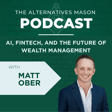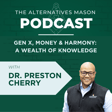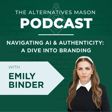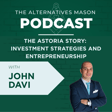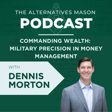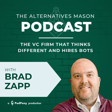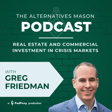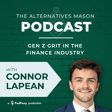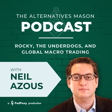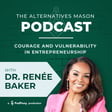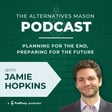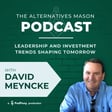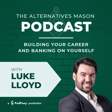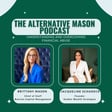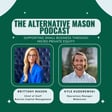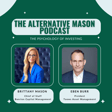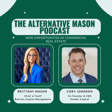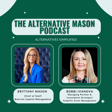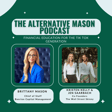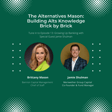Become a Creator today!Start creating today - Share your story with the world!
Start for free
00:00:00
00:00:01

The Alternatives Mason: Building Alts Knowledge Brick by Brick | Episode 26 | How Elite School Districts Became a Billion-Dollar Investment Strategy with Sean O’Dowd
What do elite school districts have to do with resilient real estate investing? In this episode, Sean O’Dowd, Managing Partner of Scholastic Capital, shares how his “Scholastic Thesis” turns high-demand education zones into a powerful, defensive investment strategy. With multi-year leases, strict buy-box criteria, and a data-driven mindset, his approach offers stability in uncertain markets. He also unpacks the growing insurance crisis in states like Florida and why it may reshape U.S. real estate for years to come.
Key takeaways:
- Multi-year leases in elite school districts create predictable income and economic stability.
- A disciplined 17-point property selection process limits risk and maximizes tenant satisfaction.
- Skyrocketing insurance costs may spark major demographic shifts in the U.S. real estate market.
Connect with us below!
Transcript
A Journey into Private Equity
00:00:00
Speaker
So it's kind of ah kind of an interesting path because it was not intentional of like, hey, i want to start private equity fund. It was, hey, I'm going to invest my own capital in a way that makes sense to me. And oh, interesting, like it's actually making sense to other people, too. And there's there's enough here that it it actually makes sense to do this full time.
Podcast Introduction and Background
00:00:17
Speaker
Welcome to the Alternatives Mason podcast with host Brittany Mason, Chief of Staff at Boundary and Capital Management. You'll learn how to build alternatives knowledge brick by brick. Boundary and Capital Management uses technology to help independent advisors scale and educate themselves on alternative
Meet Sean O'Dowd: Scholastic Capital's Managing Partner
00:00:34
Speaker
investments.
00:00:34
Speaker
And since education is such a big piece of what we do, we are excited to kick off the series to dive into the nits and grits of the alternative space. Hello everyone, it's Brittany Mason and we are back with another episode of The Alternative Mason where we are breaking down your alt knowledge brick by brick.
From Consulting to Capital Management: Sean's Story
00:00:54
Speaker
So we have a very special guest on today. We have Sean O'Dowd.
00:00:57
Speaker
He is the managing partner of Scholastic Capital. Inspired by his upbringing as the son of a teacher, he recognized the rental premium of elite school districts early on. Before launching Scholastic, Sean worked at Boston Consulting Group where he also met his wife and as a consultant for Fortune 500 companies and private equity funds.
00:01:17
Speaker
He also advises industrial goods and aerospace defense companies on integrating new technologies into operations, supply chains, and custom customer offerings. He now lives in Chicago with his wife and his three kids. He just welcomed a little baby girl. Congratulations.
00:01:34
Speaker
And thank you so much, Sean, for coming on today. It's great to have you on. Thanks for having me. I'm excited for this. Yeah. so you know, I always like to start the show off with, you know, from the very beginning, like what planted the seed for you with your interest in, you know, financial services, your earliest money memory. What what is that?
00:01:54
Speaker
Oh, earliest money memory. oh
00:01:59
Speaker
This is way, way, way back in the day. think I lived in New Jersey at the time. ah The grocery store carts had those things in them where you had to put like a quarter in it to release them. And then you couldn't you couldn't get your quarter back until you brought the cart back to the thing.
The Birth of Scholastic Capital
00:02:16
Speaker
And I was... probably five at the time, but I remember you needed a quarter to get the card out. I thought it was the coolest thing ever. So my first memory was I need to find a way to get a quarter so I can be able to get the card out and take the card out and back because I thought it was the coolest thing at the time.
00:02:31
Speaker
I love it. I love it. And did you did you have anything that you wanted to spend those quarters on ah were you just saving, recollecting? Just the card. I just wanted to be able to get the card in and out from the from the grocery store return section.
00:02:44
Speaker
And do you think that small little experience, that little small memory, how did that shape you? but it's ah It's a good question.
00:02:55
Speaker
i I mean, for the longest time, I've always thought of money as like a tool for lack of better way to describe it. And it can enable a lot of different things as as a tool can. um And I mean, I guess in that instance, in public instances, like money is a tool to enable something. And I've always thought of it that way.
00:03:14
Speaker
and And maybe it does come from from that early, early incident of like my money is a tool to get a grocery cart. Yes. Yes. That's excellent. Well, what inspired you to launch Scholastic Capital? I mean,
00:03:27
Speaker
What was that journey like when you first started it? What planted that seed? Yeah, Scholastic was interesting because it was not, in for lack word, intentional to start a fund.
00:03:38
Speaker
and So for for me, when we first got started, it was my wife and I buying homes for ourselves, our own rental properties under the thesis of, hey, if you buy homes in a really good school district, that's your demand driver, you've got a supply constrained rental market.
Strategy Evolution and Real Estate Insights
00:03:53
Speaker
high demand, low supply, like you're going to be in a really advantageous position. ah So put my own money kind of where my mouth is, did bought one and another, then another. And it got to the point of we were at number three is like, OK, we're really on to something here. There's a thesis here. It's generating return. I think it's a higher floor return than ah other things out there.
00:04:15
Speaker
it's it's time to think about whether or not this makes sense as a fund. So it's kind of ah kind of an interesting path because it was not intentional like, hey, I want to start a private equity fund. It was, hey, I'm going to invest my own capital in a way that makes sense to me.
00:04:26
Speaker
And oh, interesting, like it's actually making sense to other people too. And there's there's enough here that it it actually makes sense to do this full time. So what is the scholastic thesis? that's Is that the scholastic thesis? How did you develop that then?
00:04:41
Speaker
really through Really through trial and error with our own with our own capital. So when we as an example, we bought the first home. um It was a really good home and a good school district, supply constrained. I thought it was an advantageous position. I thought we were going to get a good tenant in there.
00:04:55
Speaker
But it was it was really through the managing of that home myself that we started to learn more about it. As an example, one of the core elements of our thesis now is we do long term leases, two to three year leases minimum for all of our tenants.
00:05:09
Speaker
That completely came out of doing this myself, my own capital. like I had no intention of multi-year leases. ah You asked me to dream this up in an Excel table i when I would would do one year leases. That's what everybody does.
00:05:22
Speaker
um But as a byproduct of our lease, our byproduct of who our tenants are, they want multi-year leases.
Real Estate's Role in Diversified Portfolios
00:05:27
Speaker
Now that's a core part of our thesis. like We believe more we believe more economically resistant to um ebbs and flows in the real estate market because I've got tenants who are in there and who've signed a five-year lease.
00:05:40
Speaker
I know what their rent is going to be three years from now. That's a lot harder for other SFR funds out there to say. And it's why we kind of fit this call it high floor defensive capital strategy that we've seen a lot of our LPs view us as.
00:05:54
Speaker
So yeah, would you say, I mean, real estate is a more a safer, more of a safer investment asset class than others? I think it depends on on how heavily someone is allocated to real estate.
00:06:08
Speaker
We kind of see two different cohorts um on our LP base. Cohort number one is folks who don't have a heavy real estate allocation and they are looking for real estate to play like a high floor defensive position in their portfolio.
00:06:21
Speaker
They might be very heavily into venture. They might be very heavily into equities, whatever might be. And they're like, real estate is going to be my high floor asset. Scholastic is a perfect fit for that. The other kind of cohort is folks who are more heavily into real estate.
00:06:35
Speaker
And in that case is we played like the defensive real estate position. So they might have, let's say 30% their portfolio and we're in real estate. They might have half of that in ground up development deals and ground up development. This can triple your money or go to zero. That's just, that those are the only two outcomes in ground up development.
00:06:52
Speaker
And then the other half is in Scholastic, which is again, you're like AT&T stock of real estate. And what metrics or indicators do you prioritize, you know, when you're evaluating like potential properties to invest in, you know, outside of, you know, the the school district?
00:07:09
Speaker
Yeah, there's there's a lot. um So we're we're trying to solve for an and unlevered yield on cost of 6.5. That's what we're looking for from a numerical perspective. But we have we've got about 17 different things in our buy box in terms of what we're looking for.
00:07:25
Speaker
ah Typically somewhere between 1.3 to 1.6% of homes at any given point fit fit that. um And it's it's things that you might expect and some of you might not. So for example, minimum three bedrooms. We don't want to buy a house below three bedrooms.
00:07:39
Speaker
um Minimum 1,400 square feet. ah Those are kind of the gimmies. Some of the more complex ones though, like we we won't buy a home on a street that's got a speed limit faster than 25 miles an hour.
00:07:51
Speaker
really hard to rent that house, really hard to sell that house. It doesn't make sense for us to do it. No pools, no solar panels, absolute non-starters for variety of reasons. um Costco within five miles, Starbucks within a mile and a half.
00:08:04
Speaker
Things like that like really matter to it the
Real Estate Trends and Challenges
00:08:06
Speaker
tenant base. And loan doesn't really, you might go like, oh, like speed limit, and like who cares? But when you kind of piece all 17 items together, it really allows you to create like, hey, this is a house that's going to be highly desirable and it's going to rent quickly. like Yeah.
00:08:21
Speaker
And what about um are there any indicators for like an up and coming, you know, neighborhood that you that you look for that, you know, that it'll that'll that'll the'll set off your little feelers, you know, that you think that other people may not be paying attention to?
00:08:38
Speaker
It's a good question. um So we we actually don't look for those neighborhoods. we We intentionally look for neighborhoods that have been really great for a really long time. okay um the The metric we actually get, there's a lot of them, but the the metrics we care about the most is ah we're looking for areas that have gone through multiple school superintendents.
00:08:56
Speaker
A really good school superintendent can make a school district better and then they retire and then the school district completely falls off the cliff. We look for somebody, a school district that's so established that one person can't screw it up.
00:09:08
Speaker
yeah So like we don't we don't buy there because we we're Midwest focused, but like Greenwich, Connecticut, like Palo Alto, California, like those are the places we're trying to buy homes in. Okay.
00:09:18
Speaker
And what current trends are there right now with the areas that you are buying in? Biggest one by far is insurance. um I think it's the biggest story in real estate over the next decade. It's not being talked about nearly enough. The the Palisades fire has kind of started the conversation.
00:09:35
Speaker
But everyone that we talk to, um especially among SFR managers who have gone very heavy Sunbelt over the past couple of years, don't see a path forward on insurance, especially in Texas and Florida over the next decade.
00:09:50
Speaker
When insurance has been rising by double and triple digits year over year for the past three to five years, there's very little reason to assume that's going to change. So you you do the math and you say, hey, this keeps happening. Like,
00:10:04
Speaker
how you can't probably own real estate in Florida in particular over the next decade, which I think is going to have a lot of interesting ramifications about migratory patterns, where people are going to live, how they're going to live, decision-making they're going make.
00:10:18
Speaker
At its core, like the average insurance premium in Florida five years ago was $1,800 a year.
Leadership Lessons from Consulting
00:10:23
Speaker
Now it's 8,000. It's like that's quadrupled in a five year period. You can't maintain those rates. Yeah.
00:10:31
Speaker
How do you see it shaping then? and affecting everything in the future in the next five to ten years. so what How are we going offset that? It's a good question. i I don't think there's a government intervention plight, which is what most people try to try to go to. I don't think there's a government and intervention plight.
00:10:48
Speaker
And the challenge is is you need insurance to get a mortgage. You can't get a mortgage otherwise. It's a requirement for a mortgage. So if you take that into a quick equation and say, hey, the insurance is going to cost more than your mortgage payment, but you have to have it in Texas and Florida and California in particular.
00:11:05
Speaker
Chachis salt happens to be the three largest states in the country. you can't If you can't get a mortgage, then first time home buyers are completely flushed out of the market. um Basically, everyone except retiree buyers are flushed out of the market, which is going to have a massive implication on the equity there, because if you own in those areas, your buyer pool just fell by 90%. You can't sell the homes for anything near what they're worth.
00:11:30
Speaker
Also, if you are, call it 30 years old, you want to buy a house for the first time, 35, 40 years old you can't buy in those states, like you have to move either Midwest, North, uh, Northeast or Northwest. Those are your only options, which I think is going to be interesting from just reversal of the trend over the past decade of people moving more sunbelt.
00:11:53
Speaker
People moving more. I'm sorry. What's that? Uh, people moving more sunbelts. I think they're going to, I think you're basically going to see the pattern reverse. more of that. I want to shift gears and talk more about you as a leadership and, you know, an entrepreneur.
00:12:06
Speaker
So working at your background in consulting and working with Fortune 500 companies, you know, how did that how does that influence the way that you do run Scholastic Capital? it was It was really beneficial because ah just as a
Remote Work and Performance Metrics
00:12:20
Speaker
consultant, like most of the time our main client that we were working with was in the C-suite.
00:12:25
Speaker
um And just by nature of consulting projects being somewhere between three to 12 weeks, I got to see called inside of the C-suite of 20 different companies.
00:12:36
Speaker
And then you start borrowing and stealing different bits and pieces there of like, I really liked the way this company did this. I hated this. Absolutely not. This was also really interesting. And you can kind of build in your own style out of that, which has been kind of an interesting, an interesting process um and not something I expected at all kind of going into consulting, but extremely useful retroactively to think about.
00:13:02
Speaker
What has been the most impactful, like strategy wise or biggest inspiration that you took, you'd say?
00:13:10
Speaker
I think the companies that worked the best, the ones that I saw, had no call it rules or expectations regarding when people worked, how people worked, where they worked, and were we're called very open on called ver remote, very open on like show up when you have whenever, leave whenever, those sorts of things.
00:13:33
Speaker
but were laser focused on everybody owns metrics. And if your metrics are terrible, you're gone. Results. so Exactly. So it was um it was very forgiving on the, we don't care how you do it as long as you perform.
00:13:48
Speaker
And I think where people were like the remote thing doesn't work is where you have less of a results focused oriented mindset because then it kind of goes wherever. But if you have the like, if you have those two combinations of you can do whatever you want, as long as you perform, then I think it's those are the companies that did best from at least from my perspective.
00:14:06
Speaker
Well, I love that. I love hearing that because I, you know, I mean, I'd i'd say since the COVID, you know, since COVID, um you know, obviously, we have a lot more people working from home and ah that kind of flexibility. But there is such a massive push to go back to the office. What are your thoughts on that then?
00:14:25
Speaker
I think there's pros and cons to an office. We don't have one. um We're an entirely remote team. We have folks literally all over the world. um And for me, like I am going to stick with
Organizational Goals and Team Dynamics
00:14:39
Speaker
that. I'm in the Chicago area. like i don't think I don't think the best 20 people in the world all live within driving distance of Chicago. So I would rather take the best people um and have them wherever they want to be.
00:14:52
Speaker
ah But we we results matter. Everybody in our team owns metrics. We have something called the scorecard. It's sent to our Slack channel every morning at 9 a.m. And people's metrics are either red, yellow or green.
00:15:03
Speaker
And if their their metrics are yellow or red, like they got they got to fix them. They got to fix them quickly. And I don't care where they live. I don't care how they do their job as long as those metrics are green.
00:15:14
Speaker
as long as they are green. That is fantastic. That's, and that's, I think visually seeing it too, it's such a trigger too, where it's like, all right, you got to get your butt in gear. We got to do something here. You only have so much time.
00:15:27
Speaker
So what other ways do you motivate your team? but There's a bunch. I think the other the other ones is we're we're very um values and goals focused. So the the values are core part of how we do things.
00:15:42
Speaker
um It's not just kind of like a poster on the wall, but it is actually how we make decisions. and It's like, hey, like these are the values of how we said we're going to act. Here's a decision to make. like if we take the values in mind, how do we make the decision that we're talking about?
00:15:55
Speaker
And then on the goal side of things, um i think people I think a big mistake that I saw with a lot of companies is there's 100 different goals. Everybody has six different initiatives that all has a goal and they've got this goal, that goal and whatever. it just gets a little messy.
00:16:09
Speaker
We have one organizational goal. And that is the only one that matters. um Compensation is directly tied to it for everybody. we have a five-year and a 10-year. When we hit the five-year goal, everybody's compensation is materially improving.
00:16:26
Speaker
And then at the 10-year, going to materially improve again. And it's everything is focused specifically on that goal. There's no diffusion of lots of goals. It's it's laser focused on what are we trying to do um with the big...
00:16:38
Speaker
The outcome of it is like we're actually doing it for LPs. it's It's our goal for LPs of what we need to be doing for them. What type of people are you looking for to be on your team? What type of qualities do they have to have?
00:16:51
Speaker
I'm looking for people who've done hard things consistently for long periods of time. So...
Traits of Successful Entrepreneurs
00:16:56
Speaker
so I'm looking for experiences um like military is a really easy example. That's a very hard thing done for a long period of time.
00:17:07
Speaker
um High level athletes. I have a huge bias towards hiring college athletes, especially in non football, basketball roles where there's no glory in being an athlete for X, Y, Z sport.
00:17:19
Speaker
um or similar dedication over a long period of time. I was a elite flute player for four, five, six, seven, eight years. And like, I played the flute for four hours a day. Those sorts of things are what I'm looking for because it's like, you you you know how to get you know how to get a really hard long-term task and goal done.
00:17:38
Speaker
Yeah. What do you feel are the three most important qualities that you have as an entrepreneur that has been directly tied to your success? I think it's a couple. I think one is like you need to have the work ethic. like So I was a college athlete. That's one of the reasons I have a bias for high-end college athletes. like a lot of It's a lot of work and over a prolonged period of time.
00:18:01
Speaker
I think the second is you need a lot of humility, for lack of a weight lack of better way to describe it. like Basically, every entrepreneur is... driving the bus for the first time and they go down an entrepreneurial path.
00:18:15
Speaker
um If you aren't filling every other seat in the bus with somebody who's been around the block before multiple times, then you're completely missing you're completely missing the boat because you need to know it's your first time driving the bus. You need to have people who have been there before. um And I'm fortunate to have a lot of people around who have been down this road many times before.
00:18:35
Speaker
And I think the the last piece is, this is going to sound ridiculous, but like positivity. Like this is going to be, this is a really long, we're two years into what's going to be a 15 plus year journey. Like you, there's a lot of hard days. You got to be able to be like, you know what? Like we're going to still get, you just got it done push through it.
00:18:54
Speaker
Yeah. Yeah. ah When did you start Scholastic? What year did you start Scholastic? Depends on where you count the official start. um the that From the standpoint of we started putting the legal documents together, like started drafting the PPM, that was 2022.
00:19:14
Speaker
twenty twenty you So three years, through end of 2022. So two, three years ago. You know, you're so young, you've built a successful company, you've done a lot over your career.
00:19:27
Speaker
What has been the biggest failure that you've encountered and the greatest lesson you've taken away from that? There's a bunch. There's definitely a bunch.
00:19:39
Speaker
Oh man, I can think of a lot actually. ah Well, right off the bat, i so I left BCG. I knew I wanted to do something entrepreneurial. I hadn't bought the houses that we had yet. So I hadn't tested the scholastic thesis at the time.
00:19:53
Speaker
ah So I interviewed at three startups. I had job offers from three startups. um I picked the one out of the three to not become a unicorn. And all of my equity and the other two would have been worth eight figures, either of them.
00:20:05
Speaker
um So like that was but that was ah that was a mistake in terms of so ah which which which opportunity. um I think another another mistake, I ah
00:20:19
Speaker
use leverage. It's interest free, which is or zero interest is why I did it, but use leverage to buy my wife's engagement ring, which was an economic smart choice, not a smart choice in the grand scheme of things because I needed to figure out a way to get capital to pay that back. And that was that was my call first entrepreneurial journey was figuring out how to do that.
00:20:43
Speaker
Boy, and you put you went all in on the ring, but she was happy, I'm sure. Yeah. yeah So what happy wifey, happy lifey. So you figured it out.
00:20:55
Speaker
and I want to talk more about aerospace, actually. Tell me more about what you're doing there. So not doing anything anymore, but I did a lot of work there while in consulting. um And a lot of it is ah preventative maintenance related.
00:21:09
Speaker
um i
Data-Driven Property Management
00:21:11
Speaker
For example, You have a plane flying, like you don't want the windshield to crack in the middle of the flight and you want to do the repairs to the windshield before plane is in the air.
00:21:21
Speaker
um And then you have to think about that across the entirety of the machine. And it's like, what can I do now cheaply to make sure that thing is going to be functional? and we're not going to have any unplanned maintenance. And number two, ah have more expensive unplanned maintenance. So that was the big kind of focus of the work. And a lot of that still applies on the real estate side of things. Like what can we do to our homes preemptively between tenants and sometimes while tenants are still in to have a $10 fix that prevents a $10,000 fix two years later.
00:21:54
Speaker
ah So it's a lot of, it's a lot of that sort of thinking. So how are you balancing that risk reward during those investment decisions? At its core, a lot of comes down to data.
00:22:06
Speaker
um So we we have a lot of data coming off the homes and we're we're fortunate that we we started Scholastic in a world where data is more prevalent and it's easier for us to do this from the beginning. It's really hard to retroactively go back and do this.
00:22:20
Speaker
But for example, like we've got we've got make model serial number for every piece of equipment in every house. I know the exact washing machine in every single house. That matters because we can now pull a lot of data and say, hey, the Whirlpool 1234 washing machine manufactured in 2015 has been an absolute terrible manufacturing year.
00:22:42
Speaker
Those ones are dying like crazy. So if we have a maintenance request that comes in with this specific one, like we're not going to bother spending $200 to repair it. We're going to replace it because we know it's going to break again. well We don't want to keep sending somebody out for $200 to fix it.
00:22:55
Speaker
um And then it also it also goes to dispatch and how we think about like dispatch and planning. Like I have a maintenance request in from 123 Appalachian Lane for the heat being out. I can say, okay, it's a um Linux 1234 furnace. It was installed three years ago. It's had two maintenance requests.
00:23:12
Speaker
Based off what the Tim was saying, we have a 95% confidence. It is this specific issue. ah call the HVAC guy and say, hey, you're going out to this house, bring this specific part for you, with you, fix it, that bomb.
00:23:26
Speaker
And then the result of that is the HVAC companies really like us. We're the easiest customer they have to deal with. The tenants happy, we fix things faster. Our data is the integrity of the data is
Future Financial Goals for Scholastic Capital
00:23:36
Speaker
still strong.
00:23:36
Speaker
Those sorts of things is is really how we we make that call a case by case decisions on on what to do with the properties. Okay. And how how can small scale investors utilize real estate like this for diversifying diversifying their portfolios?
00:23:53
Speaker
Honestly, from a small scale investor perspective, it really comes down to their time. um the I think the biggest mistake that people make in real estate is kind of just jumping in and being like, all right, people seem like they're buying some property. going to buy some property too.
00:24:07
Speaker
There are thousands and thousands of full-time, very smart people who are putting in 80 hours a week to buy real estate. You're not going to outbuck them. um It's just, if you have a full-time job, you just you're not going to beat the guy Blackstone or Invitation Holmes who's focusing on this full-time.
00:24:23
Speaker
So the the benefit to doing doing something like this is you don't have to you know you don't have to invest the cost year or two of learning that's going to put you in a position to succeed once you actually start buying property.
00:24:38
Speaker
Where do you see the next five years for Scholastic? What are your your five-year goals? So, I mean, our big goal and the the KPI that we care about is LP capital returns in a year. So we pay monthly distributions. and We care about how much we're sending out.
00:24:55
Speaker
So our five-year goal is we're we're at a $20 million a year run rate in terms of distributions out to LPs. So that would put us at a little over a billion AUM and $20 million a year going out. NAV is we use leverage. So NAV would be much lower than a billion dollars, but $20 million a year in annual distributions is where we're going to be at $20 million.
00:25:14
Speaker
And how about 10 years? That'll be 100. Yeah. Yeah. What do you feel is a ah small habit that you have beautiful you do every day that has an impact on your success?
00:25:28
Speaker
ah Yes. I've got, so we've got scholastic goals. I've got personal goals, which are also kind of scholastic goals now. um But every morning I write my goals down. It's the same four lines. I write the same four lines down every morning with that day's date.
00:25:45
Speaker
um I've been doing this since I was i high schooler, ah's ah sophomore, junior year of high
Daily Discipline and Long-Term Success
00:25:51
Speaker
school. I've got one, two, three, four, five, six, seven, eight, nine, 10, 11 of these notebooks over there that I filled out completely.
00:25:59
Speaker
um And I hit a lot more goals back in the day. um And as as the goals are accomplished, I just stopped writing them because I've already accomplished it ah and have not missed a goal yet.
00:26:11
Speaker
And you do this every day. You write your goals down every single day. I think there's power in that and like actually handwriting it in that connection rather than, you know, just typing. And I think there is a power in that.
00:26:28
Speaker
I totally agree with you. Totally agree with you. What else? i love I love learning what people do for, you know, for mental strength and I'm all about it. I make a, um actually every year, so around New Year's, every year i make a vision board and um I have, I'm also, I'm a Virgo, so maybe that has something to do with it. I'm kind of obsessed with like having my little notes and my like, you know, everywhere and my goals and I've got my mantra on my mirror that I look at every morning and You know, so I love to learn, you know, people who have who are entrepreneurs who have built successful companies.
00:27:04
Speaker
You know, how did you condition yourself to prop yourself up and being successful in that way? Yeah. Is there anything any other secret tactics that Sean has for us, for our listeners that they can maybe perhaps start adapting in their daily routines?
00:27:20
Speaker
This one, this one's kind of a weird one. um i So i have a, long story short, i have a learning disability. Most people with it can't actually speak.
00:27:31
Speaker
um The only reason that I'm able to is my memory is like one tiny smidge below photographic, um which basically allowed me to learn like what words look like in their sound rather than like alphabets and alphabet letters and put them together.
Learning from History in Decision-Making
00:27:45
Speaker
um But the benefit that comes out from that is I read a lot of history. And ah I found that actually to be extremely useful compared to all the business books out there. But like I actually found the history books to be most interesting, especially if you read history books, not retroactive of like, oh, after like, ah like Shoe Dog is a good example. Not like the retroactive after I did it, here's all the amazing things, but the story of like the come up.
00:28:10
Speaker
If you read a lot of those books and then you can start noticing patterns across them, you actually start kind of running into soio situations on a day-to-day basis and you're like, Somebody else dealt with this. I've read the book about what they did. This is what they did, how it worked out.
00:28:24
Speaker
Three other people also did the same thing. And they all they all made the same decision at this point. It all worked out for them. Like, I'm going to make the same decision too. um i I think that has been actually extremely useful um and beneficial because I can just remember the books. But I think reading books, um history books about people who are on their way rather than already arrived is extremely, extremely interesting.
00:28:47
Speaker
That is fascinating. Yeah. I mean, you know, and yeah, understanding history, otherwise it's going to repeat itself. So learning from other people's failures and setbacks as well.
00:28:57
Speaker
I think it's, it is so important to, thank you for sharing that, by the way, thank you for sharing that about yourself. I think it's such a great example of, yeah, flipping the script on something. You know, I know I've encountered this in my life, something that I thought could have been like the greatest setback or, hurdle has actually turned into something that is my greatest asset or, you know, a part of my story that's allowed me to propel myself into, you know, to the next level. But it really is all your mindset and your perspective and your approach to life and to those types of challenges. Totally agree.
00:29:38
Speaker
Completely, completely agree with it. And, um, There's a quote that somebody said, i don't remember who, um which is ironic, but ah the the quote is,
00:29:50
Speaker
if you dream of an uncommon life, you eventually realize there's no path.
Teaching Children About Money
00:29:55
Speaker
ah There's no option but to leave leave an uncommon path to do so, which I always found to be like a re reassuring comment of like, hey, i thought I was going to be doing this. It's not the right fit for me. It's not working, whatever.
00:30:10
Speaker
um But like this is my uncommon path. And that's that's what I'm doing right now. And it's going to eventually work it out and then grant give you things. Do you feel, are there, what what particular books or podcasts or um are there, is there anyone in the industry that you're that you love to listen to and and learn from specifically?
00:30:31
Speaker
think there's a couple. um Book-wise, ah My best book out there, I think my favorite is, I actually gave it to all my LPs this past year is, ah but what if we're wrong?
00:30:44
Speaker
And the entire premise of the book is like, but what if we're wrong about like these deeply held beliefs that we have? um as ah as an example, it gives the it gives the example of If you go back like a couple thousand years ago, you said that the sun was the center of the universe, you would have been like publicly stoned.
00:31:01
Speaker
And now it's like if you say that, it's like, well, obviously that person's wrong. But the the thinking is that, like hey, as science and things like that improved, there's definitely things that like you and I believe to be true now, that 100 years from now, they're going to be like, wow, they were really dumb for thinking that.
00:31:17
Speaker
um And it's an interesting book because it it basically is a massive book on like playing devil's advocate to all of your thinking, which I found to be extremely interesting and helpful um regarding real estate specific things.
00:31:31
Speaker
ah There's an operator in Wisconsin named Logan Rankin. He is a former target executive who went into real estate. He doesn't take ah out the capital and he scaled his portfolio um from zero to about 600 million in about five or six years. He's unquestionably the best sub sub-institutional real estate operator in the country right now.
00:31:53
Speaker
and is absolutely fascinating to ah to learn from. So if if there's somebody who's like, hey, I want to learn more about real estate, like Logan is by far the best operator in the country right now.
00:32:04
Speaker
Excellent, excellent. So you shifting gears a little bit. So um ah a new little one at home, you have three three little ones at home.
Final Advice for Entrepreneurs
00:32:14
Speaker
what um What are you passing along to your children or how do you intend to shape their relationship to money as they grow into young adults in this world?
00:32:27
Speaker
um I saw totally stole this from a college professor of mine. um ah She guest started a couple of classes. um ah Angela Duckworth, she's the the grit.
00:32:38
Speaker
um Yes, I love that book. It's a great book. Yeah. She's great. um she she's She's phenomenal. ah But she she gave some talk about how she, there was lecture, I guess is where I would describe it, about how she was trying to teach her daughter's grit.
00:32:54
Speaker
And the big thing that she did was she doesn't emphasize outcome, but emphasizes process with her daughters. So for example, if she her daughters did like really we' got an A on a test, it's not you're so smart, it's you worked really hard to ah to get the A.
00:33:12
Speaker
which is like not it doesn't sound that groundbreaking but ah if you notice it when you see other people you see people talk with kids like oh you did great like you're so smart like that's the default that people fall into yeah you actually want to really reward like the effort in the process so um my uh my son saw somebody do a handstand and thinks it's like the coolest thing in the world so he wants to do a handstand so he like practices on against the wall and like times himself to see how long completely his own doing But every time he does a little bit more, it's like you're working really hard. You're practicing. That's why you're doing better.
00:33:46
Speaker
Not like, oh, you're so strong and holding that handstand. It's like those sorts of things are are what trying to, um trying to emphasize with them. Trying to emphasize. That's fantastic. Do you have any, um any advice for entrepreneurs, any, anything that we can leave with our listeners that are maybe perhaps trying to start their own business and break into the industry?
00:34:08
Speaker
ah I think the biggest one is it's going to take two times as long as you think it will, no matter what you do. um i I've found entrepreneurs just in general tend to be, think the whole reason to be an entrepreneur is because you think you can do it better.
00:34:24
Speaker
So you're you're trying to branch out and create your own something or you think there's an opportunity. that the The person who thinks that is somebody who is used to being given a task or a deadline and finishes it in half the time. That's just how they operate.
00:34:37
Speaker
um So when they see something online, they're like, oh, it's 10 years from initiation to exit for a tech company. They're going to be like... I can do that in five um because that's how that's how they've always done things. Like, oh, it's like it's 18 months from zero to seed. Like I can do that in nine months or you're a fund. Like the average fund is like 10 years from zero to a billion dollars. Like I can do it in five.
00:35:02
Speaker
It's not. It's the the people who are going into this entrepreneurial path are also deadline beaters. And whatever you think the timeline is going to be, tell yourself it's going to be two times as long because that's what will prevent people from getting frustrated of why is the business not an XYZ milestone that I had in mind yet? It's because it actually truly does take that long.
00:35:23
Speaker
That's fantastic advice. And keep the positivity. Don't quit. Like you said. Like you said, very much, very much. so Well, Sean, thank you so much. It has been such a joy to learn from you today. i think that, um, you know, you get, you gave us a wealth of knowledge on, uh, you know, the real estate industry and all the, it's especially paying attention to the school districts and, and everything. And so is there anything that you'd like to leave our listeners with and please also share where they can find you?
00:35:52
Speaker
online? ah Good question. Nothing to have a mind to leave regarding finding us at WerbsGlossToCapital.com. And we we tend to share quite a bit pretty openly about what we're doing, what we're working on.
00:36:07
Speaker
We share our investor updates publicly um little after the actual investors get them. um But we do we do tend to share investor updates publicly so people can can see what we're to and follow along from that.
00:36:19
Speaker
Thank you so much. Thank you everyone who tuned into this episode. it was wonderful learning with all of you and we will see you next time right here live from the green couch.
00:36:32
Speaker
The opinions expressed in this program are for general informational purposes only and are not intended to provide specific advice or recommendations for any individual or any specific security. It is only intended to provide education about the financial industry.
00:36:47
Speaker
To determine which investments may be appropriate for you, consult your financial advisor prior to investing. Any past performance discussed during this program is no guarantee of future results. Any indices referenced for comparisons are unmanaged and cannot be invested into directly.
00:37:02
Speaker
As always, please remember investing involves risk and possible loss of capital. Please seek advice from a licensed professional.
